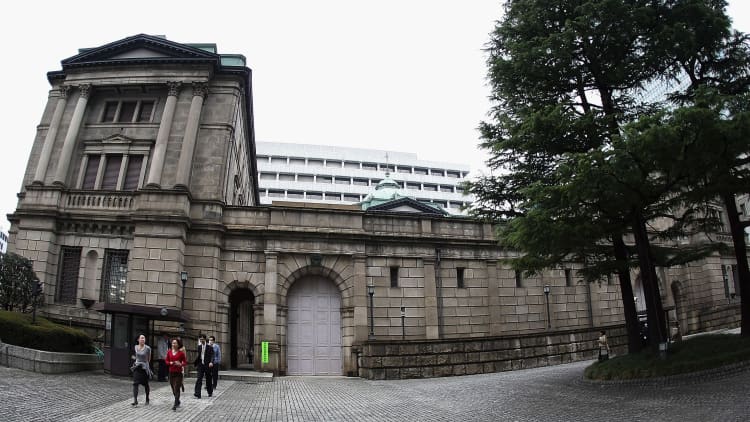
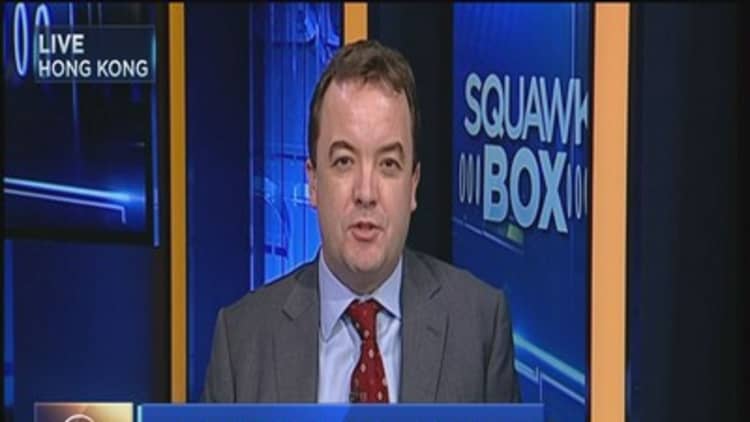
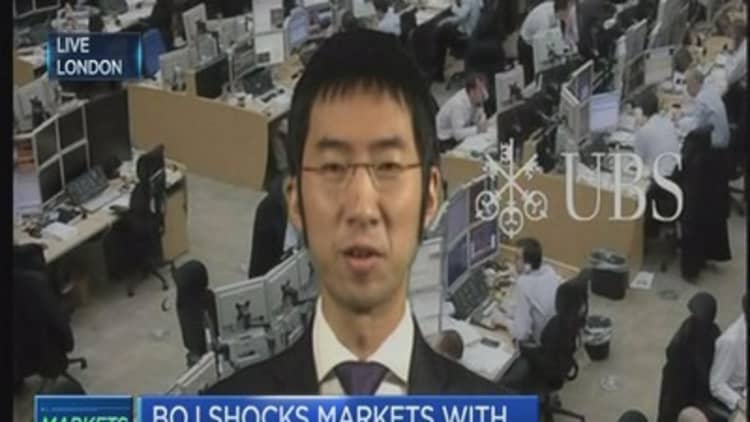
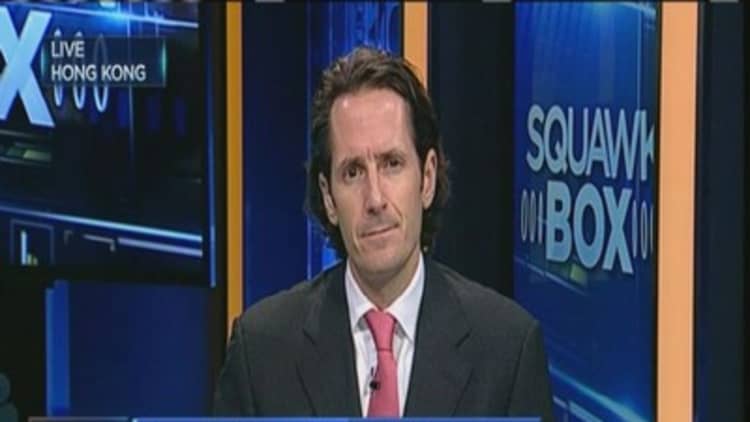
The Bank of Japan blindsided global financial markets Friday by adopting negative interest rates for the first time ever, buckling under pressure to revive growth in the world's third-largest economy.
In a move that was signaled by the Nikkei business daily minutes ahead of the decision, the BOJ said it will apply a rate of negative 0.1 percent to excess reserves that financial institutional place at the bank, effective February 16.
Charging banks for the privilege of parking some of their excess funds was an unexpected move, although not without precedent. Central banks in Europe, notably the European Central Bank, have slashed interest rates below zero before to push down borrowing costs and prod banks to lend more.
The BOJ left its program to buy government bonds and exchange traded funds (ETFs) unchanged.
The central bank noted that the Japanese economy has recovered modestly with underlying inflation picking up, along with spending by companies and households.
"Recently, however, global financial markets have been volatile against the backdrop of the further decline in crude oil prices and uncertainty such as over future developments in emerging and commodity-exporting economies, particularly the Chinese economy," the BOJ said in a statement accompanying the decision.
"For these reasons, there is an increasing risk that an improvement in the business confidence of Japanese firms and conversion of the deflationary mindset might be delayed and that the underlying trend in inflation might be negatively affected."
The new system announced on Friday will divide the outstanding balance of each account at the BOJ into three tiers and a positive, zero or negative interest rate will be applied to each one. The bank also clearly communicated a dovish bias, with officials saying they would undertake additional easing if necessary using quantitative and qualitative tools, as well as interest rates.
In addition, the BOJ did not set a lower limit on the yields of Japanese government bonds it purchases, meaning that longer-maturity Japanese interest rates may follow short rates into negative territory, explained Bill Adams, senior international economist at PNC Financial Services Group.
The news sent financial markets into a frenzy, with the benchmark Nikkei shooting up as much as 3 percent and the yen sliding 2 percent against the greenback. U.S. stock futures meanwhile rallied 1 percent.
Richard Harris, CEO of Port Shelter Investment Management, supported Friday's decision. "They have a problem with buying more government bonds since it just monetizes government debt. Negative rates are the way ahead to go, it's good for Japan."
Hitting 2% inflation
Negative rates are aimed at achieving the government's 2 percent inflation target "at the earliest possible time," said the BOJ's statement.
The BOJ now forecasts core inflation to average 0.2 to 1.2 percent between April 2016 and March 2017. Governor Kuroda had previously said he hoped to hit 2 percent inflation by late 2016 but markets are widely skeptical of that.
Collapsing inflation expectations were a key reason underpinning high expectations for fresh stimulus. Ahead of Friday's decision, leading banks, including Societe Generale and BNP Paribas, estimated the probability of further easing at 40-50 percent.
Consumer prices have remained stubbornly low, seen by December's core consumer prices released earlier on Friday. The index, which includes oil but not fresh food, ticked up just 0.1 percent on year, unchanged from the previous month.
Friday's shock move is a direct reaction to the downgraded inflation outlook as a result of January's oil price crash, which has a bigger impact on global central banks excluding the U.S. Federal Reserve, Adams said.
"The Bank of Japan's more aggressive easing is a signal that major foreign central banks are not ready to follow the Fed in withdrawing monetary stimulus. More monetary easing announcements outside of the United States are likely in 2016....Foreign economies' domestic vulnerabilities make their central banks more sensitive to the influence of lower oil prices on inflation than the Federal Reserve."
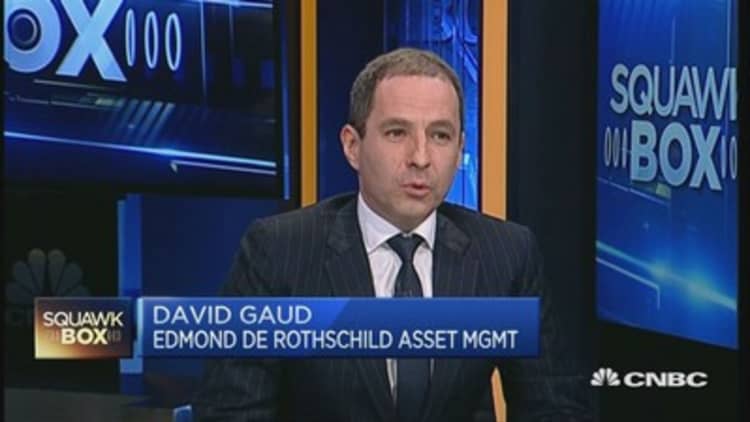
Offsetting volatility
The surprise decision was also taken to preempt any dents to business confidence arising from recent market volatility, the BOJ said. It was a close call, with 5 members voting for negative interest rates and 4 against.
Year-to-date, the Nikkei has tanked more than 10 percent,while the haven yen is 1.2 percent higher against the greenback, pushing Japanese front-end interest rates to a premium versus Europe's negative levels.That's dealt a blow to corporate sentiment, particularly as a rising currency weighs on domestic exporters, whose overseas earnings have been boosted by a weaker yen since Abenomics began three years ago.
An appreciating yen also threatens to deter wage growth,which is becoming an increasingly significant focus for the central bank.
Prime Minister Shinzo Abe has pushed companies to raise employee salaries and bonuses as he seeks to boost personal consumption levels, a key element of Abenomics, his ambitious plan to reinvigorate the Japanese economy through a combination of fiscal spending, monetary stimulus and structural reforms.
Friday's outcome also comes a day after the surprise resignation of Economy Minister Akira Amari, which was the latest blow to frazzled markets. Prime Minister Abe quickly appointed Nobuteru Ishihara, a former executive of the ruling Liberal Democratic Party (LDP), as Amari's successor but little immediate impact is expected on the government's fiscal stimulus program.
Still, Amari's resignation could signify a lack of progress in Abenomics, Tim Quinlan, vice president and economist at Wells Fargo, told CNBC.
"It's been three years now and Abenomic's track record is spotty at best. Amari's stepping down is somebody taking ownership and responsibility for the fact that Abenomics is not living up to the hype."


